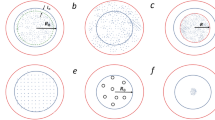Abstract
IN the course of some experiments on the formation of unstable, molecular aggregates, notably in phosphorescent bodies, I was led to try whether such dynamically unstable groupings could be produced by the action of radium upon certain organic substances. It will scarcely be necessary to enter here into an account of the many speculative experiments which I have at one time or another tried, but it will suffice if I describe, as briefly as possible, the experiment which, amongst others, has led to a very curious result, and that is the effect of radium chloride and radium bromide upon gelatin media, such as those generally used for bacterial cultures.
This is a preview of subscription content, access via your institution
Access options
Subscribe to this journal
Receive 51 print issues and online access
$199.00 per year
only $3.90 per issue
Buy this article
- Purchase on Springer Link
- Instant access to full article PDF
Prices may be subject to local taxes which are calculated during checkout
Similar content being viewed by others
Author information
Authors and Affiliations
Rights and permissions
About this article
Cite this article
BURKE, J. On the Spontaneous Action of Radio-active Bodies on Gelatin Media. Nature 72, 78–79 (1905). https://doi.org/10.1038/072078c0
Issue Date:
DOI: https://doi.org/10.1038/072078c0
This article is cited by
-
Creating life and the media: translations and echoes
Life Sciences, Society and Policy (2018)
-
Erasing Borders: A Brief Chronicle of Early Synthetic Biology
Journal of Molecular Evolution (2016)
-
Obligate Blutparasiten oder Entmischungsformen von Lipoiden?
Zeitschrift für Die Gesamte Experimentelle Medizin (1933)
Comments
By submitting a comment you agree to abide by our Terms and Community Guidelines. If you find something abusive or that does not comply with our terms or guidelines please flag it as inappropriate.



